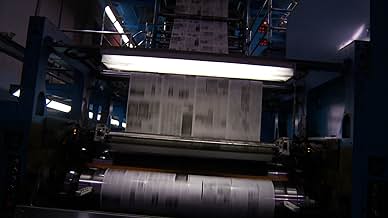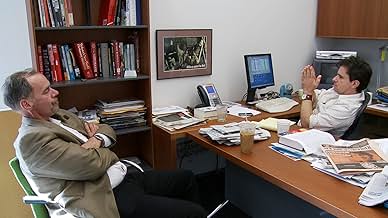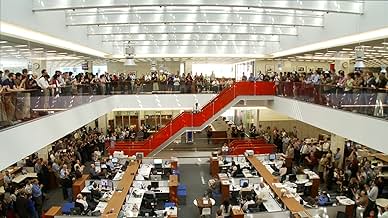Unprecedented access to the New York Times newsroom yields a complex view of the transformation of a media landscape fraught with both peril and opportunity.Unprecedented access to the New York Times newsroom yields a complex view of the transformation of a media landscape fraught with both peril and opportunity.Unprecedented access to the New York Times newsroom yields a complex view of the transformation of a media landscape fraught with both peril and opportunity.
- Awards
- 3 wins & 10 nominations total
- Director
- Writers
- All cast & crew
- Production, box office & more at IMDbPro
Featured reviews
The digital revolution , internet, etc have started to compete with printed media such as the legendary newspaper The New York Times, a newspaper that is depicted in this documentary.
We get follow some of their reporters, the job at the editing office, and also the new approach to the internet and surfpads.
But will The New York Times be able to compete with websites like Wikileaks etc?
And how will they survive in climate with ever descending ad incomes?
Will the internet completely destroy investigating journalism?
Because nowadays anyone can be investigating journalist by simply putting their discoveries on a personal blog or any other type of internetbased platform.
These and many other questions are discussed in this highly interesting documentary about media from one of the most prominent newspapers in the world.
The documentary also touches upon the heavy criticisms that newspaper received during the Judith Miller, Jayson Blair scandals and ever growing question, can we trust media at all?
The only flaws I can think of is that sometimes director Andrew Rossi seem to lack focus, not knowing what he wants to tell, he should made the viewers get closer to some of the people working at the New York Times.
I would love to know more about David Carrs background, a colourful journalist, and some of his co workers background.
But this film should been seen by anyone wanting to know more about media, journalism in this riveting documentary. So viewers who liked Outfoxed: Rupert Murdoch's War on Journalism (2004), The Most Dangerous Man in America: Daniel Ellsberg and the Pentagon Papers (2009), Starsuckers (2009) should see this one.
Without a doubt, the NYT has had its problems (like Judith Miller's pushing the WMD claims about Iraq, and Jayson Blair's outright falsification of stories), but it remains an important source of information. In years past the Internet was not widespread, so it was through newspapers that Watergate and the Pentagon Papers got exposed. All of which shows the importance of having an informed population. All in all, this documentary is a really good look at the inner workings of the news business. I recommend it. Among the other interviewees are executive editor Bill Keller, and Baghdad bureau chief Tim Arango.
There is some argument given towards what constitutes journalism, but for me the real guts of the matter boils down to our absolute NEED for investigative reporting. I have always given value to bulldog reporting as a checks and balances for our system. Maybe, just maybe, our public officials and corporate leaders will toe the line if they are being watched. Sure, we can all rattle off a long list of when that hasn't been the case, but I truly believe, having reporters following and snooping does make a difference in the actions of those in charge ... and even if it doesn't, it certainly makes a difference in the accuracy and depth with which their actions are written about.
The filmmaker has been given substantial access to the media desk inside the newsroom. We even get to sit on a portion of the morning meeting where the senior editors decide what the lead stories will be. Personally, I would have loved a couple more hours of just that! But just as fascinating is how Bruce Headlam manages the media news, and in particular, star reporter David Carr. Mr. Carr is a hardened reporter with the spectacular ability to cut directly through to the important point and focus on the details, verify those details, and then summarize in a concise, understandable manner. We see this in full beauty with his handling of the crisis and scandal at the Chicago Tribune under Sam Zell's banner.
Today, we like our news spoon fed to us in 20 second sound bites. So we find our favorite websites and we scan the headlines, which themselves are scans of news stories. My favorite moment of the movie occurs on a discussion panel when David Carr holds up a printout of the home page of an "aggregator". Moments later he makes the point that without real reporters and news teams (like the NYT), this aggregator's home page would look quite different ... he then holds up that same home page with 90% of the stories cut out because their source is a real news organization.
Some attention is paid to Twitter and other social media outlets. This seems to be finally accepted by the reporters as being effective for two things: a delivery system for information and a grapevine with lightning speed. Of course, no verification is required for a "news" story to hit Twitter, and therein lies its limitation.
We get interviews from both Gay Talese and Carl Bernstein on the importance of news reporting. Evidence is provided through mentions of the Pentagon Papers, Wikileaks and Watergate. Judith Miller and Jayson Blair are topics that embarrassed and did significant damage to the industry ... but changes were adopted to (hopefully) prevent re occurrence. The News of the World scandal is too new to have made the film, but it certainly would have added a fascinating subtext to it.
The bankruptcy trail of so many newspapers is discussed, along with the possibility of this happening at The Times. Personally I wish more detail had been provided on the survival strategy of this institution. Since the release of the film, there has been a change in the Executive Editor position. Bill Keller, who is featured prominently in the morning meetings, has stepped down and been replaced by Jill Abramson. Ms. Abramson is charged with driving and building online presence and revenue. We should all be wishing her success as the world is a better place with The New York Times.
Newspapers – and especially the elite newspapers – remain a crucial element in our political culture in that they provide a check against abuse of power by both government and corporations. The internet new media still relies on old media for its reporting and is not equipped to replace it. Clearly new models for cooperation between new and old are needed that will allow mainstream media to continue to profitable. The NY Times is proud, magisterial, occasionally arrogant, and absolutely necessary. Like any old institution, it will survive if it continues to change and evolve for new times and technologies.
Page One is part of an on-going conversation that the United States is having about how media will evolve in the age of the Internet. It is useful film for engaging the broader public in the conversation.
But the movie's at its best when it's about the newsroom, and this is compelling stuff: decisions being made during the Wikileaks info dump, Iraq withdrawal, and the laying off o a great deal of the paper's workforce. You do get to be a fly on the wall, and during these scenes, it's good stuff.
7/10
Storyline
Did you know
- Quotes
Shane Smith: I'm a regular guy and I go to these places and I go, "OK, everyone talked to me about cannibalism, right? Everyone talked about cannibalism." Now I'm getting a lot of shit for talking about cannibalism. Whatever. Everyone talked to me about cannibalism! That's fucking crazy! So the actual... our audience goes, 'That's fucking insane, like, that's nuts!' The New York Times, meanwhile, is writing about surfing, and I'm sitting there going like, 'You know what? I'm not going to talk about surfing, I'm going to talk about cannibalism, because that fucks me up.'
David Carr: Just a sec. Time out. Before you ever went there, we've had reporters there reporting on genocide after genocide. Just because you put on a fucking safari helmet and looked at some poop doesn't give you the right to insult what we do. So, continue.
- ConnectionsFeatured in De wereld draait door: Episode #6.173 (2011)
- SoundtracksLost in Detroit
Written and performed by Rolfe Kent
From the motion picture Up in the Air (2009)
Courtesy of Paramount Pictures
Details
- Release date
- Country of origin
- Official sites
- Language
- Also known as
- Page One: Inside the New York Times
- Production companies
- See more company credits at IMDbPro
Box office
- Gross US & Canada
- $1,067,028
- Opening weekend US & Canada
- $28,911
- Jun 19, 2011
- Gross worldwide
- $1,077,982
- Runtime1 hour 32 minutes
- Color
- Sound mix
Contribute to this page



















